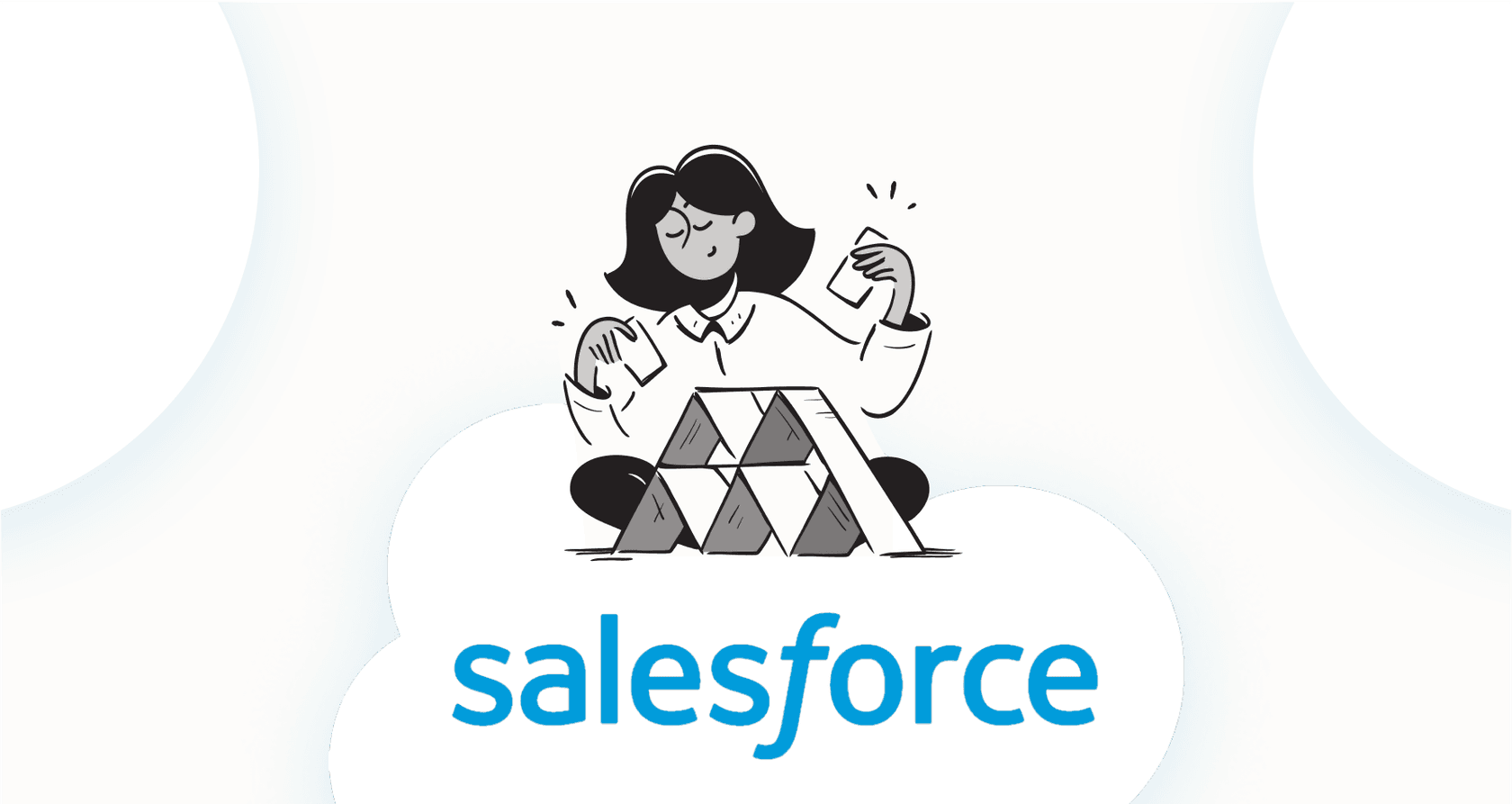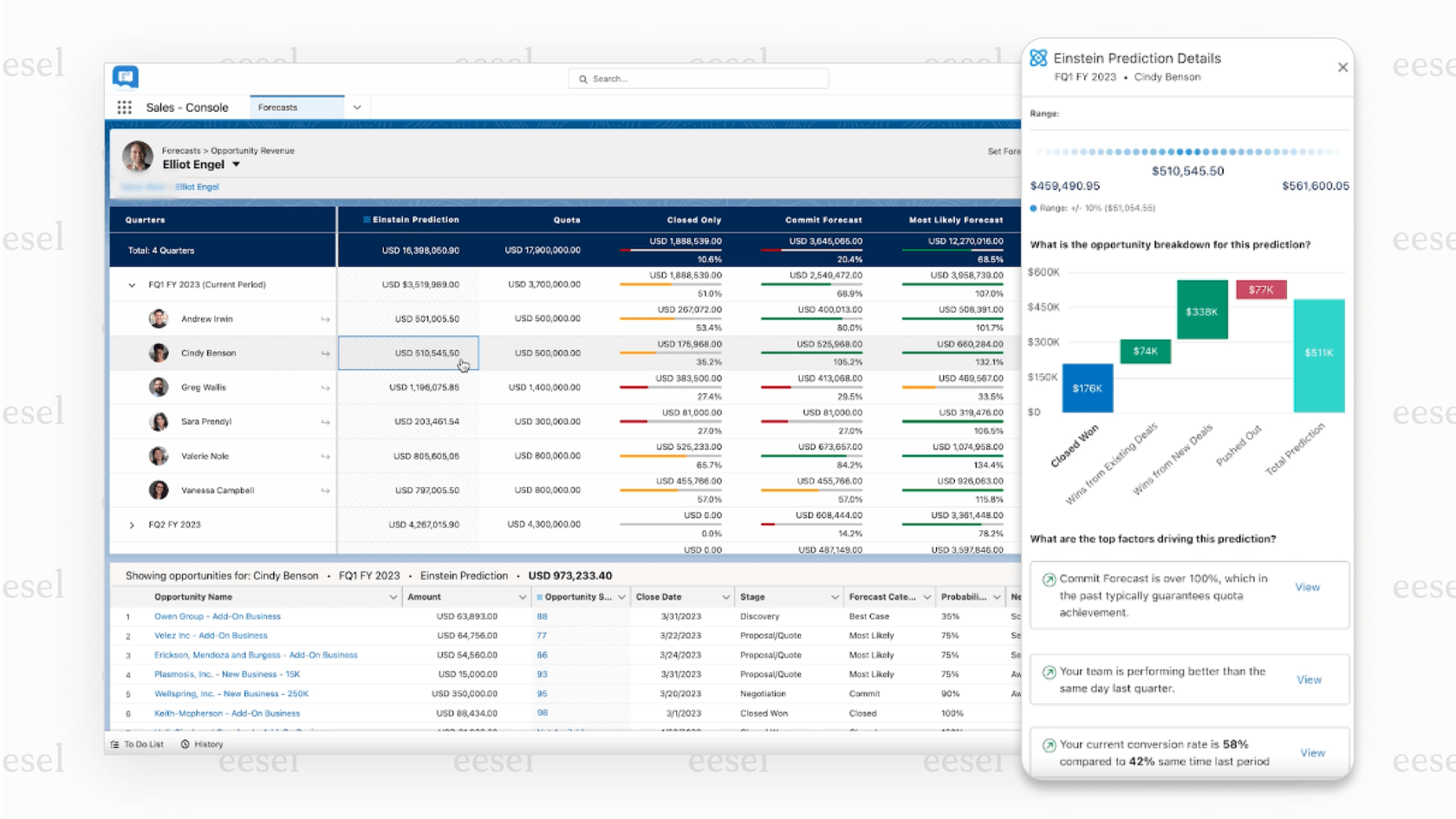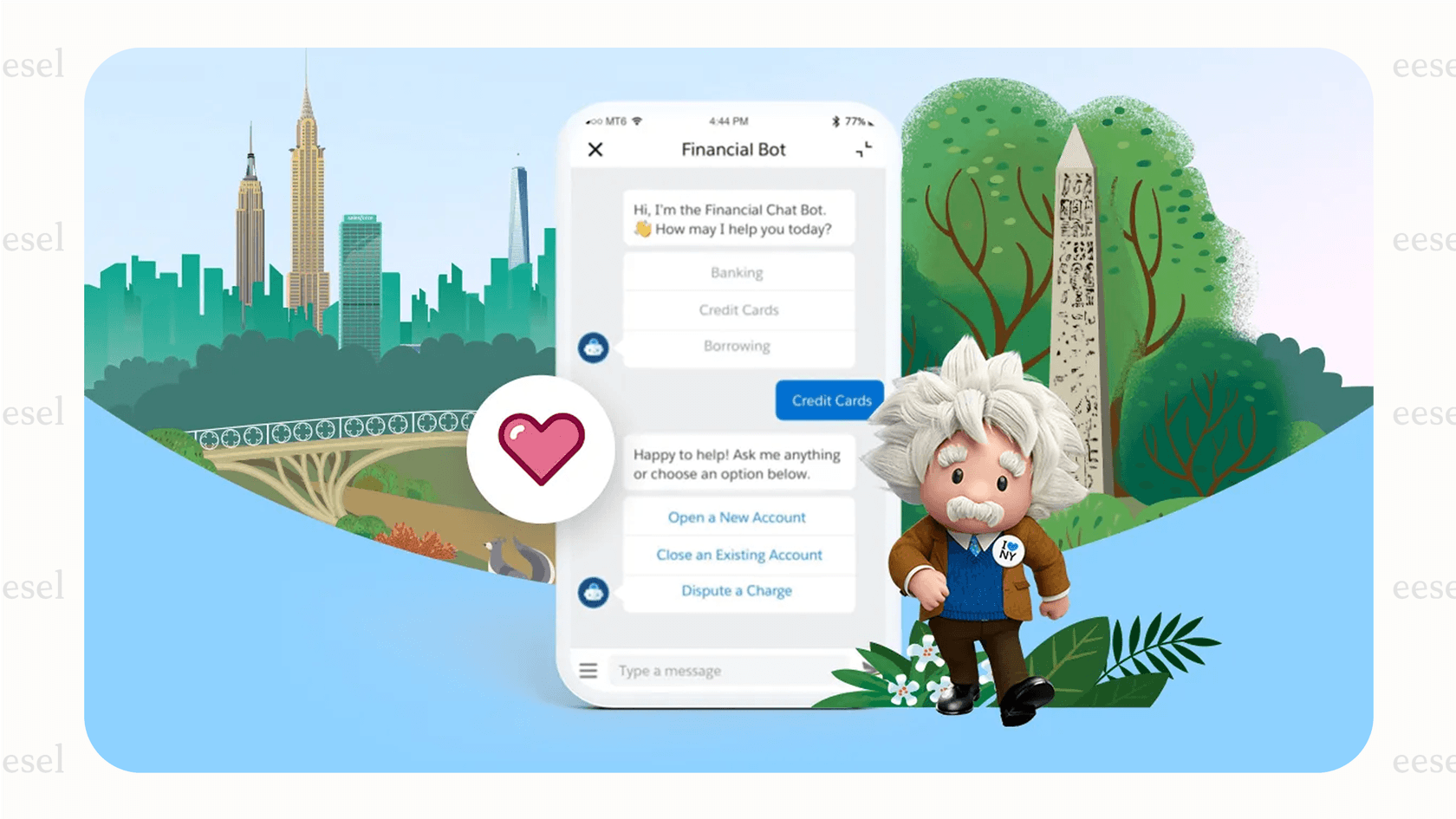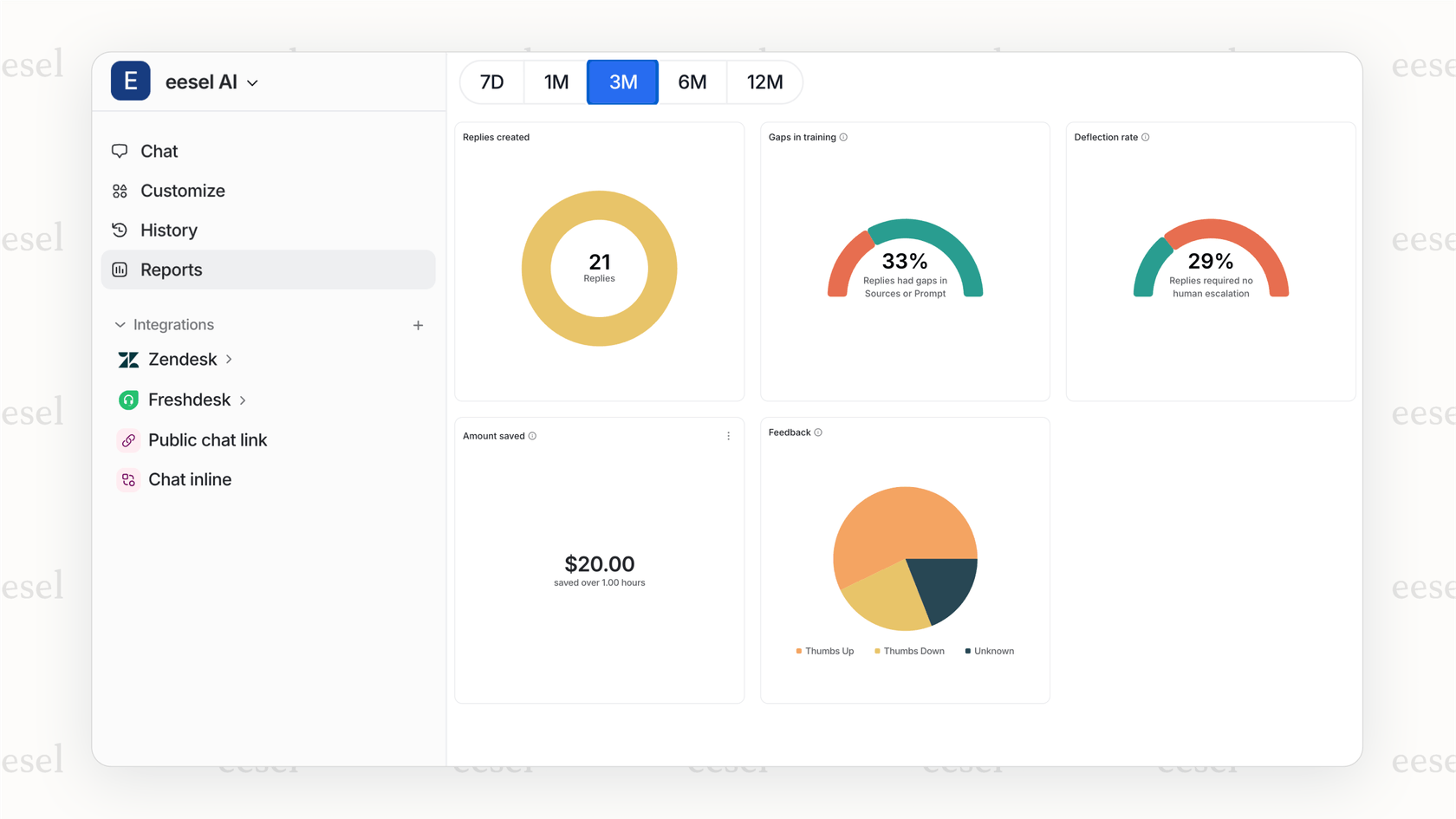
Let's be honest, artificial intelligence isn't some far-off concept anymore; it’s a tool businesses are using right now. Big platforms like Salesforce are leading the charge with powerful AI like Einstein and Agentforce, promising to reshape everything from sales to customer service.
But here’s the catch: the reality on the ground is that a staggering 80% of enterprise AI projects don't quite hit the mark. They often get bogged down by unexpected complexity, messy data, and costs that seem to pop up out of nowhere. This guide digs into the real story of how companies can scale AI with Salesforce, uncovering the main challenges and a much simpler way to get a return on your investment.
Understanding Salesforce's AI offerings
Before we jump into the "how," it helps to know what we're actually working with. Salesforce's AI world is built on a few main pieces that are meant to work together inside their bigger Customer 360 platform. Getting a handle on these is the first step for anyone looking to scale AI with Salesforce.
-
Salesforce Einstein: Think of this as the original AI brain of Salesforce. It adds predictive and generative smarts across their different products. It can help score leads in Sales Cloud, guess which customers might leave in Service Cloud, and create personalized content in Marketing Cloud.
-
Data Cloud: Salesforce pitches this as the bedrock for trustworthy AI. The Data Cloud is designed to pull all your customer data, from Salesforce and elsewhere, into one single, up-to-the-minute profile. The idea is to feed the AI clean, complete data so it can give you useful answers.
-
Agentforce: This is Salesforce's toolkit for building and using autonomous "AI agents". These aren't just simple chatbots; they're designed to handle more complicated, multi-step jobs across the business, almost like a digital workforce.
It's a powerful lineup, no doubt. But it's built for huge companies that are ready for a major platform investment. It takes deep integration and a full-on commitment from the top down to get it right.

The challenge of building a trusted AI foundation
The promise of any AI system, Salesforce included, really boils down to one thing: data. Salesforce’s solution is the Data Cloud, a platform for bringing all your customer data together. For a lot of businesses, though, this is where the first big roadblock appears.
The Salesforce approach: One source to rule them all
Salesforce sees its Data Cloud as the mandatory first step. The goal is to build a massive, perfect foundation where every piece of customer information lives. This means:
-
Pulling in scattered data from all your different systems.
-
Standardizing all the definitions to create a common language for your data.
-
Setting up tight security and governance through their "Einstein Trust Layer."
It sounds great, but it's a huge project. It often requires a big spend on data engineering, IT resources, and a long setup time before you even get to see what the AI can do. For many companies, this translates to months, or even years, of groundwork before any real automation happens.
A more agile alternative: Unify knowledge right where it is
Most teams, especially in customer support or IT, don't want to rebuild their entire data infrastructure. They just want to get accurate answers to people, quickly. This is where a more nimble approach has a clear edge.
Instead of launching a massive data unification project, a tool like eesel AI connects directly to the places where your knowledge already lives, and it only takes a few minutes.
-
Instant connections: With one-click integrations for help desks like Zendesk, wikis like Confluence and Google Docs, and chat tools like Slack, eesel AI starts learning from your scattered info right away.
-
Train on what actually matters: One of the coolest things about eesel AI is that it can train directly on your past support tickets. It picks up your brand's voice, understands common customer problems, and learns from successful solutions from day one, all without you having to manually train it.
-
No "rip and replace": You don't have to switch help desks or start a complicated data project. eesel AI fits right into your current setup, delivering value from the AI almost instantly.
So, while Salesforce is focused on building a perfect data palace from the ground up, eesel AI builds a smart, practical bridge to the knowledge you already have. It solves the immediate problem of getting reliable AI-powered support running fast, letting you see a return on your investment in days, not quarters.
Key use cases for scaling AI with Salesforce
Once you have a data foundation (however you build it), Salesforce offers a ton of AI use cases. But when you try to roll them out at scale, you can run into issues with control and customization that make them less useful in the real world.
AI for customer service
With Service Cloud and Agentforce, Salesforce wants to automate support by handling common questions, summarizing tickets, and helping agents find answers. The goal is pretty straightforward: make agents more productive and cut down on how long it takes to solve issues.

The problem: When you go with a giant, all-in-one platform, you often give up fine-grained control. Pushing a big red button to automate everything can feel a little scary. What if the AI says the wrong thing to a sensitive customer? You need a way to test and deploy with confidence.
A more controlled approach: This is where eesel AI's simulation and control features are a huge help.
-
Powerful simulation mode: Before you let the AI talk to a single customer, you can test it on thousands of your past tickets. eesel AI gives you a detailed report showing exactly how it would have answered, what its resolution rate would have been, and where you might have gaps in your knowledge base. It takes the guesswork out of the equation and helps you trust the system.
-
Selective automation: You don't have to automate everything all at once. With eesel AI, you can set specific rules for which tickets the AI should handle (like, only questions about "how-to" guides) and which ones it should pass to a human immediately. This step-by-step rollout is much safer and more effective for teams that care about quality.

AI for sales and marketing
Salesforce's Sales AI and Marketing AI use data to write personalized emails, score leads, and forecast sales. These tools are meant to help teams focus on the important stuff and connect with customers more effectively.
The problem: These tools are only as good as the AI's ability to understand your specific business and what to do next. Generic prompts or rigid, pre-built actions can really limit how helpful it can be.
A more customizable approach: eesel AI gives you a completely customizable workflow engine.
-
Custom AI persona and actions: Using a simple editor, you can define the AI's exact tone of voice. Even better, you can create custom actions that let the AI look up live information (like an order status from Shopify) or update fields in a ticket, making it feel like a real part of your team.
-
Scoped knowledge: You can easily restrict the AI to specific sources of information for different situations. This ensures it never goes off-script or gives answers based on information it shouldn't have, which is key for staying accurate and on-brand.
Navigating cost and complexity
For most companies, the biggest hurdles to figuring out how they can scale AI with Salesforce are cost and complexity. Salesforce is built for the enterprise, and its price tag and setup process reflect that.
The Salesforce pricing model
Trying to figure out Salesforce pricing can be a real headache. For most of its AI products, including Agentforce and Data Cloud, the price isn't listed online. You have to click the dreaded "Contact Sales" button, which usually kicks off:
-
A long sales process with demos and custom quotes.
-
Annual contracts that require a big upfront payment.
-
Extra costs for implementation, consulting, and training.
-
Potential add-on fees for more features or higher usage.
This works for big corporations with dedicated budgets and procurement departments, but it's a major roadblock for smaller businesses or teams that just want to get moving and show results.
A simpler, more transparent alternative
On the flip side, eesel AI was built to be transparent and self-serve from the get-go.
| Feature | Salesforce AI | eesel AI |
|---|---|---|
| Pricing Model | Opaque, "Contact Sales" | Transparent, public plans |
| Billing | Typically annual contracts | Monthly or annual options |
| Core Principle | Platform-level commitment | No per-resolution fees |
| Setup | Requires demos and sales calls | Fully self-serve, live in minutes |
| Onboarding | Often requires paid implementation | Free, one-click integrations |
eesel AI's pricing is refreshingly simple:
-
No per-resolution fees: Our plans are based on features and a set number of AI interactions. You’ll never get a surprise bill after a busy month, which is a common complaint with other tools that charge you for every ticket the AI solves.
-
Flexible plans: You can start with a month-to-month plan and cancel anytime. This lets you prove it's worth the money without getting locked into a long-term contract.
-
Radically self-serve: You can sign up, connect your help desk, set up your AI, and go live without ever needing to talk to a salesperson. This shrinks the time it takes to see value from months to minutes.
This approach makes powerful AI accessible to everyone, allowing teams of any size to start automating their support and working more efficiently right away.
A faster path to scaling AI
There's no question that figuring out how companies can scale AI with Salesforce is a big deal for many enterprises. The platform is incredibly powerful if you have the resources, time, and company-wide strategy to do it right. It’s a deep, long-term investment in a single system.
But for most businesses that need to get things done now, a more practical approach makes a lot more sense. The future of AI at work isn't just about giant, all-in-one platforms; it's about smart, focused tools that plug right into the software you already use every day.
eesel AI is a perfect example of this modern approach. It's a powerful AI layer that makes your existing tools better, giving you immediate value without the friction of typical enterprise software. By focusing on a self-serve setup, clear pricing, and a confident, gradual rollout, eesel AI lets you scale your support automation in a way that's both effective and affordable. Instead of spending the next year planning your AI strategy, you could spend the next hour actually putting it to work.
Ready to see how fast you can get your own AI support up and running? Get started with eesel AI for free and launch your first AI agent in minutes.
Frequently asked questions
Many projects struggle with data complexity, unexpected costs, and lengthy implementation times. The blog highlights that a staggering 80% of enterprise AI projects don't hit their mark due to these issues.
Salesforce primarily offers Einstein for predictive and generative AI, Data Cloud for unifying customer information, and Agentforce for building autonomous AI agents. These components are designed to work together within the broader Customer 360 platform.
Salesforce’s approach with Data Cloud suggests a significant data unification project as a first step. However, an agile alternative focuses on connecting to existing knowledge sources instantly, avoiding a full rebuild.
Salesforce AI often involves opaque "Contact Sales" pricing, leading to annual contracts, significant upfront payments, and extra costs for implementation and consulting. This model is built for large enterprises with dedicated budgets.
Yes, agile solutions like eesel AI offer a transparent, self-serve approach by connecting directly to existing knowledge sources in minutes. This allows for immediate value and a gradual, controlled rollout without enterprise-level commitment.
Salesforce AI is leveraged for customer service (automating common questions, summarizing tickets) and for sales/marketing (personalizing emails, scoring leads). However, fine-grained control and customization are crucial for real-world effectiveness in these areas.
Share this post

Article by
Kenneth Pangan
Writer and marketer for over ten years, Kenneth Pangan splits his time between history, politics, and art with plenty of interruptions from his dogs demanding attention.







